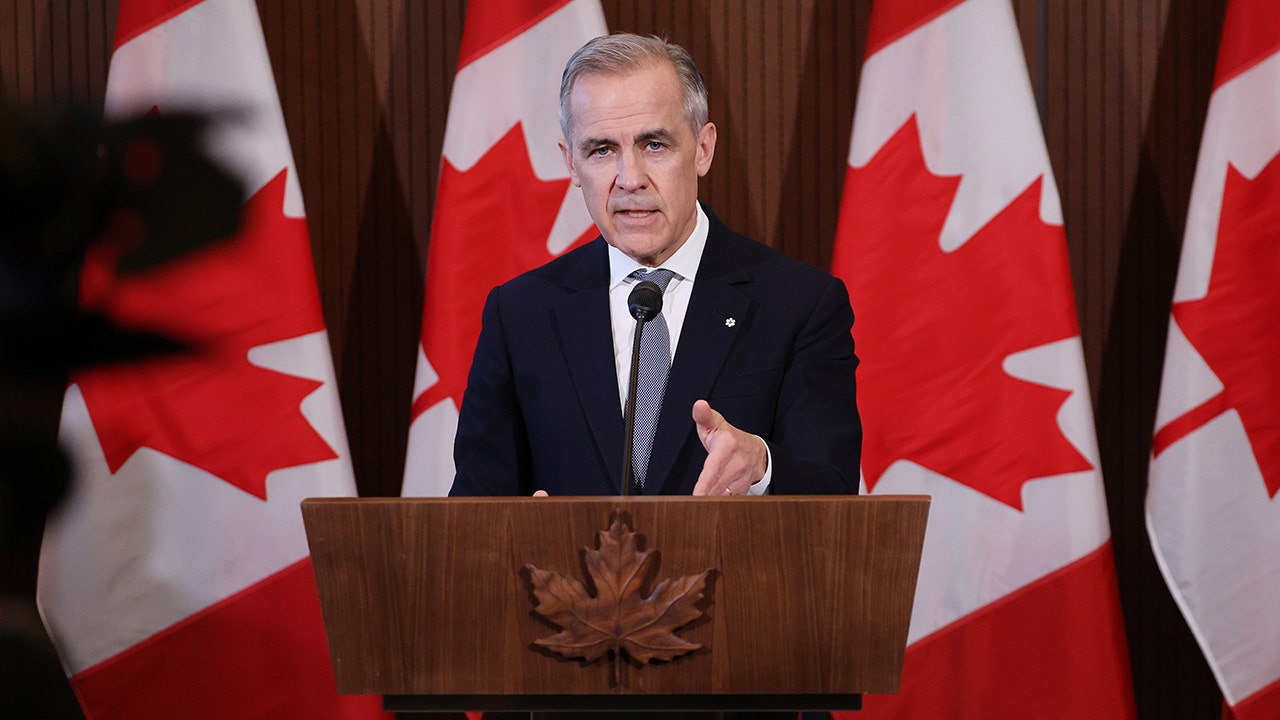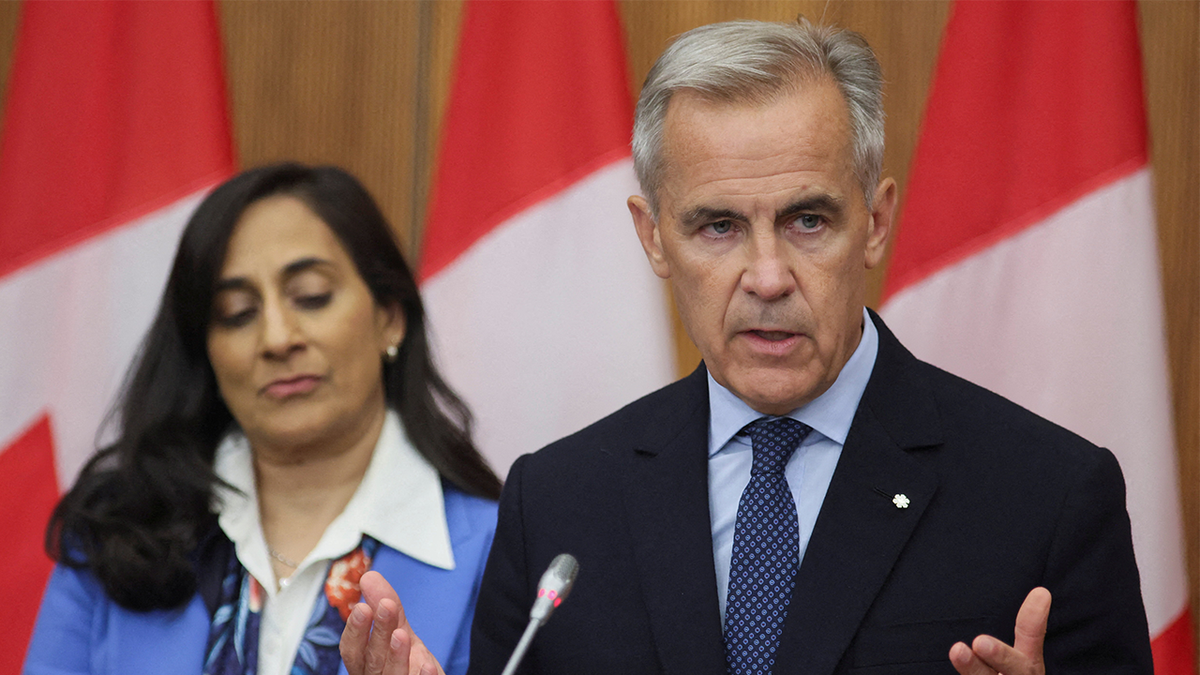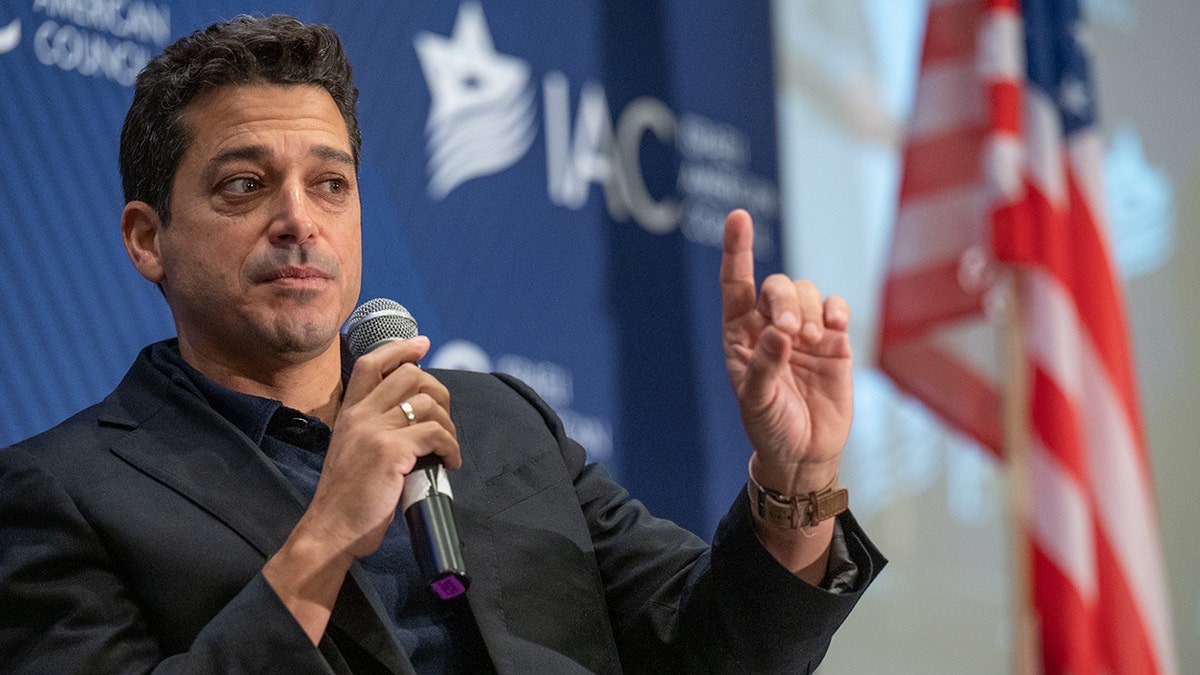Business
Canadian PM Carney faces backlash over Montreal Jewish father assault

NEWYou can now listen to Fox News articles!
Canadian Prime Minister Mark Carney faced criticism for failing to promptly condemn the assault of a Jewish man walking with his children in a Montreal suburb on Friday.
The man was walking with his three children in a park when an unknown individual approached and sprayed them with water. The assailant then physically assaulted the father, knocking him to the ground and tossing his kippah away, a traditional skullcap worn by observant Jewish men.
On Monday, police in Montreal announced the arrest of a 27-year-old suspect in connection with the assault, an incident that has fueled growing calls for the Canadian government to crack down on rampant antisemitism.
CANADA’S ANTISEMITISM ENVOY RESIGNS, CITING EXHAUSTION AMID HATE SURGE

Canadian Prime Minister Mark Carney speaks at a press conference about recognizing Palestinian statehood while Foreign Affairs Minister Anita Anand listens, in Ottawa, Ontario, Canada, on July 30, 2025. (Reuters)
“Canada had the chance to change course after the disaster of [former Prime Minister Justin] Trudeau’s tenure, but instead chose to continue marching toward the abyss. It is beyond doubt that a violent incident like the one we witnessed in Montreal draws direct inspiration from the tailwind Canada’s government, de facto, gives to Hamas,” Israeli Minister for Diaspora Affairs and Combatting Antisemitism Amichai Chikli told Fox News Digital.
“Canada is not yet at the stage of Belgium or the U.K.—both of which have become extremely dangerous for Jews—but it is headed there, slowly and inexorably,” he added.
Carney commented on the incident at 11 p.m. Saturday — roughly a day and a half later — after Israeli Foreign Minister Gideon Sa’ar publicly criticized Ottawa’s response.

Israeli Minister of Diaspora Affairs and Combatting Antisemitism Amichai Chikli condemned the attack on a Jewish man in Montreal. (Shahar Azran/Getty Images)
“The attack on a Jewish father in Montreal late yesterday, in front of his own children, is an appalling act of violence. Everyone in Canada has an inalienable right to live in safety,” Carney posted on X.
Sa’ar had called him out on X, writing, “The incident shown in this video is shocking and stomach-turning. … These are images reminiscent of dark periods of Jewish persecution. This is appalling.
“The Canadian government must do more to fight antisemitism!” he added.
Although Jews account for less than 1% of Canada’s population, antisemitism was behind 18.8% of all reported hate crimes in 2024. Of the 1,342 incidents classified as religiously motivated, 920, or 68.5%, were directed at the Jewish community.
Richard Robertson, director of research and advocacy at B’nai Brith Canada, noted that just a week earlier a synagogue in Victoria, British Columbia, had been defaced with antisemitic threats, underscoring that Jew-hatred has become a nationwide problem.
FAITH UNDER FIRE: NETANYAHU CALLS OUT EFFORTS TO DIVIDE CHRISTIANS AND ISRAEL IN US
“As the situation continues to devolve, Jewish Canadians do not need to be placated with mere lip service. We need our leaders to take clear and unequivocal positions and work vigorously to facilitate change. Anything less only serves to further embolden and enable the vitriolic cohort of our society that continues to attack our community,” Robertson told Fox News Digital.

A man fixes the lock of the doors of Congregation Beth Tikvah as police investigate an alleged arson at the synagogue in the suburb of Dollard-des-Ormeaux in Montreal on Wednesday, Dec. 18, 2024. (Christinne Muschi/The Canadian Press via AP)
“What happened in Montreal on Friday afternoon was absolutely horrific. It must serve as a wake-up call for the entire city. This is what happens when civic leaders permit an atmosphere where hateful thugs feel as if they can act with impunity,” he said.
The attack occurred amid a broader climate of intense antisemitism, which recently led Deborah Lyons, Canada’s special envoy on Holocaust remembrance and combating antisemitism, to resign in July — three months before her term ended — citing physical and emotional exhaustion.
It also took place against a backdrop of strained Canada-Israel relations. Canada is one of four countries, alongside France, Australia and the United Kingdom, that have announced their intention to recognize a Palestinian state.
Canada’s former ambassador to Israel, Vivian Bercovici, told Fox News Digital that it’s difficult to discuss the past two years of rising antisemitism in Canada without looking back to October 2015, when former Prime Minister Justin Trudeau was first elected prime minister.
“In my view, Trudeau’s approach to the conflict was very unsophisticated. He had a very quickly growing Muslim population in Canada, and he was careful not to do anything to alienate those voters,” Bercovici said.

Anti-Israel protesters holding antisemitic posters in Alberta, Canada, on April 13, 2025. (Photo by Artur Widak/NurPhoto via AP)
CLICK HERE TO GET THE FOX NEWS APP
According to Statistics Canada, the share of the population identifying as Muslim more than doubled over 20 years, increasing from 2.0% (579,640 people) in 2001 to 4.9% (1,775,715 people) in 2021.
“What we’ve seen, as in many other parts of the West, is that they have come and demanded that we change to accommodate them — that we change the way we do things. Some of their most consistent demands concern Israel and Jewish communities, which have increasingly become targets,” Bercovici said.
Business
FDA official calls UniQure’s gene therapy a ‘failed’ treatment for Huntington’s disease

Thomas Fuller | SOPA Images | Lightrocket | Getty Images
UniQure needs to run another study to prove that its gene therapy “actually helps people with Huntington’s disease,” a senior U.S. Food and Drug Administration official said on a call with reporters Thursday.
The official, who requested anonymity before discussing sensitive information, confirmed the agency has asked the company to run a placebo controlled trial of its treatment, which is administered directly into the brain. UniQure has said that type of study isn’t ethical because it would require putting people under general anesthesia for hours, a characterization the official disputed.
“So what is really going on? UniQure is the latest company to make a failed therapy for Huntington’s patients,” the official said. “They likely acknowledge or understand at some deep level that their trial failed years ago, and instead of doing the right thing and running the correct clinical study, UniQure is performing a distorted or manipulated comparison in the mind of FDA.”
The comments mark the latest development in a messy public spat between UniQure and the FDA, and as the agency comes under fire for a number of recent drug approval application rejections, including some where companies have accused it of going back on previous guidance. FDA Commissioner Marty Makary in an interview with CNBC’s Becky Quick last week seemingly criticized UniQure’s gene therapy for Huntington’s disease. Makary didn’t name UniQure but described its treatment.
UniQure then accused the FDA of reversing its stance that the company’s clinical trial data would be sufficient to seek approval. UniQure’s study used an outside database to measure how patients with Huntington’s disease might decline without treatment, known as an external control. UniQure has said it wouldn’t be feasible to run a true randomized, double-blind placebo-controlled study, considered the gold standard, because it wouldn’t be ethical to make people undergo a sham hours-long brain surgery.
The FDA official said the agency “never agreed to accept this distorted comparison” and the FDA “never makes such assurances.” Instead, the “FDA will always say, ‘Well, we have to see the data when we get it.'”
UniQure didn’t immediately comment.
The company’s stock rose more than 10% on Thursday and has fallen 58% this year as of Thursday afternoon.
Business
US mortgage rates rise to 6% after three-week slide as oil-driven bond yields climb – The Times of India

The average long-term US mortgage rate edged higher this week, ending a three-week decline as bond yields rose amid oil-price pressures linked to the war with Iran.The benchmark 30-year fixed mortgage rate increased to 6% from 5.98% last week, mortgage buyer Freddie Mac said on Thursday. A year ago, the average rate stood at 6.63%, AP reported.The modest uptick breaks a three-week slide in borrowing costs, with mortgage rates having hovered close to the 6% mark for most of this year. Last week’s average had marked the first time the rate dipped below 6% since September 2022, reaching its lowest level in nearly three and a half years.Mortgage rates are influenced by several factors, including the Federal Reserve’s interest-rate policy, investor expectations about inflation and economic growth, and movements in the bond market.They typically track the direction of the 10-year US Treasury yield, which lenders use as a benchmark for pricing home loans.The 10-year Treasury yield rose to 4.14% at midday Thursday, up from around 4% a week earlier.Treasury yields have moved higher in recent days as rising oil prices added fresh inflation concerns, potentially complicating the Federal Reserve’s plans to cut interest rates.
Business
US stocks today: Dow tumbles 800 points, S&P 500 and Nasdaq slip as oil surges after Iran tanker strike – The Times of India

US stock markets fell on Thursday as investors turned cautious after the previous session’s rally, while rising oil prices and geopolitical tensions weighed on sentiment.The Dow Jones Industrial Average dropped 801 points, or 1.6 per cent, dragged down by losses in stocks such as Caterpillar and Goldman Sachs. The S&P 500 declined 0.9 per cent, while the Nasdaq Composite fell 0.6 per cent.The selloff came as crude oil prices jumped to their highest level since June 2025 after Iran said it had struck an oil tanker with a missile. US West Texas Intermediate crude futures surged 6 per cent to trade above $79 per barrel, while international benchmark Brent crude futures rose about 3 per cent to more than $84 per barrel. Oil prices had stabilised in the previous trading session.Markets had rallied on Wednesday, supported by gains in technology and semiconductor stocks. The Dow had snapped a three-day losing streak, while the S&P 500 and Nasdaq Composite ended the session with solid gains.Despite the ongoing US-Israeli air campaign against Iran, US markets have performed relatively better than European and Asian counterparts this week, largely supported by a rebound in technology stocks that had been hit hard during February’s selloff.The tech-led recovery in the previous session helped the Nasdaq erase its weekly losses, putting the index on track to end the week in positive territory if gains hold through Friday.Investors remain concerned that prolonged disruption to shipping through the Strait of Hormuz — a key global energy corridor –could push oil prices higher and add to inflationary pressures through rising energy and shipping costs.Markets are particularly wary of crude prices moving towards $100 per barrel, which could complicate the Federal Reserve’s efforts to control inflation while considering interest-rate cuts.“For the past couple of years, bringing inflation down has been the Fed’s entire focus, and they were finally making progress. But if energy stays expensive, inflation could start climbing again and that would force the Fed to rethink its plans,” said Adam Sarhan, chief executive of 50 Park Investments, Reuters quoted.According to data compiled by LSEG, investors are increasingly expecting the Federal Reserve to delay a 25-basis-point interest rate cut to September from the previously anticipated July timeline.Among sectors, healthcare led declines on the S&P 500, dropping 1.6 per cent. The energy index, however, gained 0.7 per cent, with shares of ConocoPhillips and Valero Energy rising about 2 per cent each.The CBOE volatility index (VIX), widely seen as a gauge of market fear, rose 0.9 points to 22.08, reflecting cautious investor sentiment. The small-cap Russell 2000 index fell 1 per cent.Travel and tourism stocks, which are sensitive to fuel costs, were under pressure. Delta Air Lines slipped 3.3 per cent, while Royal Caribbean Cruises declined 0.6 per cent.On the other hand, some travel booking companies rallied sharply. Booking Holdings jumped 11 per cent and Expedia surged 8 per cent after a report by The Information said OpenAI was scaling back on-platform shopping checkout plans for ChatGPT, easing concerns about disruption to online marketplace businesses.Chip stocks showed mixed performance. Nvidia edged down 0.3 per cent, while Marvell Technology gained 1.3 per cent.Shares of Broadcom rose 2.9 per cent after the chip designer projected that its artificial intelligence chip revenue could exceed $100 billion next year.Elsewhere, Trade Desk surged 22.5 per cent following a report that OpenAI had held early discussions with the advertising technology company regarding the sale of advertisements.Economic data released on Thursday showed the number of Americans filing new applications for unemployment benefits remained unchanged last week.Investors are also awaiting remarks from Federal Reserve Vice Chair Michelle Bowman later in the day, ahead of the closely watched non-farm payrolls report due on Friday.On the New York Stock Exchange, declining stocks outnumbered advancers by a ratio of 2.48-to-1, while on the Nasdaq the ratio stood at 1.63-to-1.The S&P 500 recorded four new 52-week highs and two new lows, while the Nasdaq Composite registered 17 new highs and 33 new lows.
-

 Business7 days ago
Business7 days agoIndia Us Trade Deal: Fresh look at India-US trade deal? May be ‘rebalanced’ if circumstances change, says Piyush Goyal – The Times of India
-

 Business1 week ago
Business1 week agoAttock Cement’s acquisition approved | The Express Tribune
-

 Politics1 week ago
Politics1 week agoWhat are Iran’s ballistic missile capabilities?
-

 Politics1 week ago
Politics1 week agoUS arrests ex-Air Force pilot for ‘training’ Chinese military
-

 Fashion1 week ago
Fashion1 week agoPolicy easing drives Argentina’s garment import surge in 2025
-

 Business1 week ago
Business1 week agoHouseholds set for lower energy bills amid price cap shake-up
-

 Sports1 week ago
Sports1 week agoSri Lanka’s Shanaka says constant criticism has affected players’ mental health
-

 Sports6 days ago
Sports6 days agoLPGA legend shares her feelings about US women’s Olympic wins: ‘Gets me really emotional’





